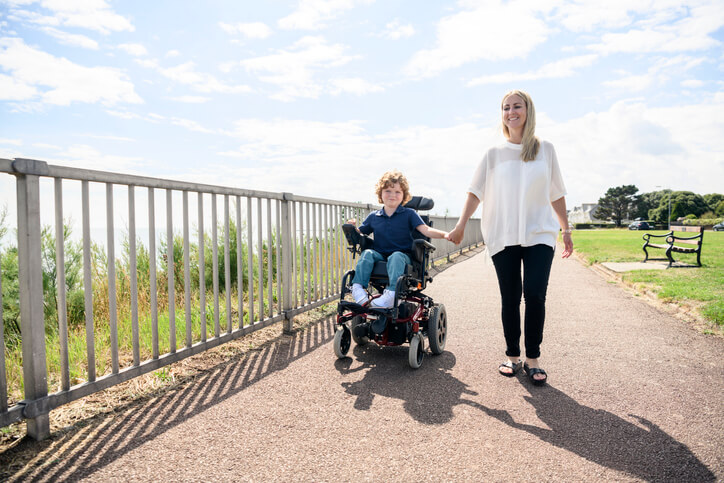Surrogates come from all different types of life circumstances — and why shouldn’t they? The desire to help another person become a parent is one that transcends all demographics, and it’s an admirable choice for every woman who follows this path.
If you are thinking of becoming a surrogate, you probably have a lot of questions about your eligibility. And, if you’ve come to this article, you are probably asking a big one: Can I be a surrogate if my spouse or child has mental or physical disabilities?
There are some important considerations to make with this kind of situation, but it’s not an automatic disqualifier for your surrogacy dreams.
People from all kinds of different backgrounds are able to become surrogates, and many share their unique experiences online.
We’d encourage you to contact our surrogacy specialists at 1-800-875-BABY(2229) for more information. Our team will be happy to evaluate your situation and answer your questions to help you make the best decision for your family.
In the meantime, if your spouse or child has disabilities, here are a few things you’ll want to consider before moving forward with the surrogacy process:
The Amount of Care Your Family Member Needs
As you probably know, there is a lot of variation when it comes to the severity of disabilities. Ultimately, your ability to become a surrogate will depend on the severity your family is affected by your family member’s special needs.
Being a surrogate requires a lot of time and energy. You will need to attend regular doctor’s appointments and maintain a relationship with your intended parents. And don’t forget how difficult pregnancy can be — you should be prepared to be more physically exhausted than normal during those nine months.
So, how will your family member’s disabilities impact your pregnancy?
It all depends on how much your family member relies on you in their day-to-day life. If their disabilities are minimal, and they can mostly take care of themselves independently, their condition likely won’t cause problems in your surrogacy journey. However, if your daily routine involves 24/7 care (including physically moving or restraining your family member), pregnancy will make those responsibilities much harder.
In general, the more severe your family member’s disabilities, the less likely you will be able to become a surrogate. While your desire to help another family is generous, your own family must always come first.
How Intended Parents May Feel About Your Situation
As you consider the surrogacy journey, remember that intended parents have a say, too. Intended parents are able to choose the surrogate candidate they are comfortable with, and that includes a home environment where their unborn baby will be safe and well cared for.
Understandably, a surrogate whose family member has disabilities may give them pause. They may be concerned about the safety of a surrogate’s pregnancy if she is physically and emotionally caring for her child 24/7. They might also worry about the stability of the household; for example, abrupt changes in a chronic medical condition can put a lot of financial and emotional stress on a family. To have this happen during a surrogate pregnancy would be overwhelming for all involved.
If you are eligible to be a surrogate but care for a child or spouse with special needs, your surrogacy specialist will always be honest about your situation with prospective intended parents. You should be prepared to answer questions from the intended parents about your plans for family care during your journey (more on that below) and how you plan to commit yourself to the surrogacy process with your other obligations.
Finding intended parents to work with may take a little longer but, if you are approved through our agency, our surrogacy specialists will work with you to find the perfect match, however long it takes.
What Preparations You’ll Need to Make
If you are eligible for the surrogacy process and understand the extra requirements of choosing this path with a disabled family member, your surrogacy specialist will be there to help. Before you can be matched with intended parents and create a legal surrogacy contract, you will need to make a plan for your upcoming surrogacy journey.
Because of your unique situation, you will need to consider how your spouse or child with disabilities will get the care they need during your pregnancy. As a surrogate, you will need to be committed to the partnership with intended parents; you can’t be solely focusing on your family member when you’re carrying someone else’s baby.
So, before you get started, you and your surrogacy specialist will make a plan based on these questions:
- Who will care for your spouse or child when you attend doctor’s appointments?
- What will happen if you are placed on bedrest during the last few months of your pregnancy?
- Who will care for your family member if you have to travel overnight to the intended parents’ fertility clinic?
- What steps will you take if your family member has a health scare during your surrogacy journey?
- Who will take over your personal responsibilities when pregnancy makes it difficult or dangerous to carry them out?
- Who will be your support system should you need last-minute assistance?
Just because your family member has certain disabilities doesn’t mean you are automatically disqualified from surrogacy. To find out if gestational surrogacy is right for, please reach out to our specialists today.
